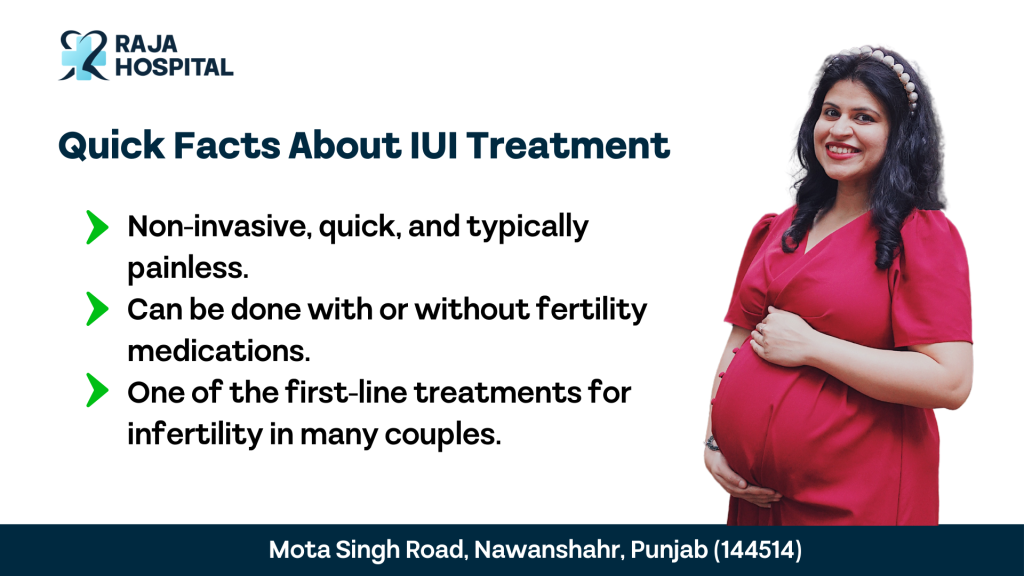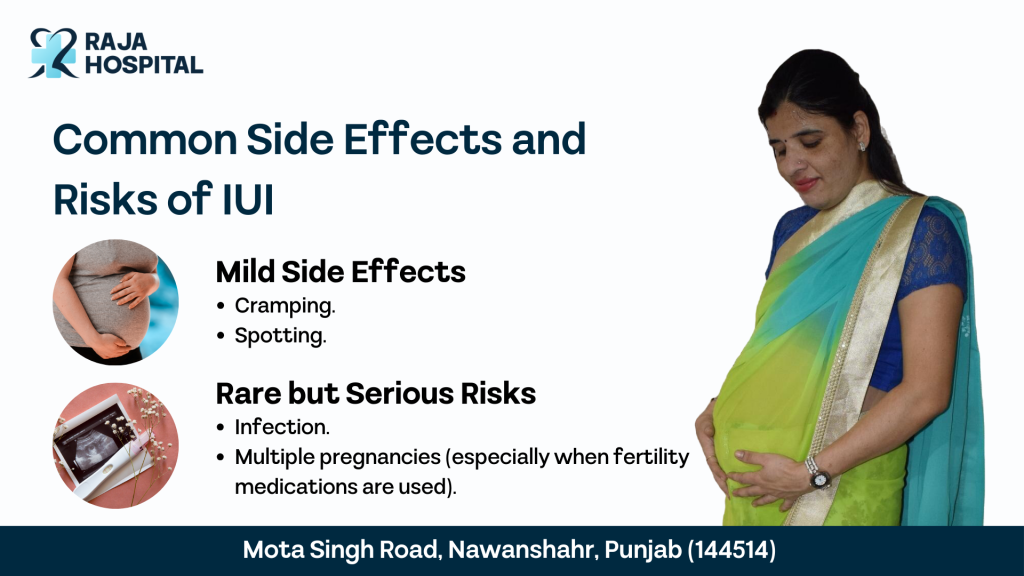IUI Treatment in Punjab: 3 Key Steps for Better Results

REVIEWED BY DR. LAKSHITA SAINI (MBBS, MS OBS & GYNAE) ON 4th November 2024
Trying to conceive is sometimes an endless journey of hope and heartbreak. You’ve been married for years; you’ve tried everything that you can think of, and still, you wait for that positive pregnancy test. It’s not an easy road, and not one you have to travel alone. Does any of that sound familiar?
If you have been trying for more than 5 years with no success, the frustration and emotional toll can be overwhelming. But there are options. Nowadays, one of the least invasive yet truly effective treatments is intrauterine insemination. In this guide, we have broken it down step by step so you may make an informed choice about whether IUI is the right path for you.
Struggling with same?
Book Your Appointment With Our Expert Doctors

What is IUI (Intrauterine Insemination)?
Intrauterine Insemination (IUI) is a fertility treatment aimed to considerably increase the success rate of a woman’s chance of becoming pregnant. This occurs when sperm is directly introduced into a woman’s uterus around the time of ovulation. With this simple and straightforward procedure, there’s a significant bypassing of many of the obstacles that naturally occur in the course of fertilization.
How Does IUI Work?
- A semen sample is obtained, processed, and selected for the healthiest concentration.
- The selected specimen is introduced directly into the uterus using a small catheter.
- Duly timed around the time of ovulation. This aims to promote maximizing chances of fertilization.
Quick Facts About IUI Treatment

- Non-invasive, quick, and typically painless.
- Can be done with or without fertility medications.
- One of the first-line treatments for infertility in many couples.
How IUI Differs from Other Fertility Treatments
IUI stands out among other fertility treatments because it’s less invasive and more affordable. To help you better understand how it compares, here’s a quick breakdown:
Comparing IUI with IVF and Other Fertility Options
| Criteria | IUI | IVF (In Vitro Fertilization) | Other Techniques |
| Cost | Lower | Higher | Varies |
| Invasiveness | Minimally invasive | Highly invasive | Varies |
| Success Rate | Moderate (depends on factors) | Higher than IUI | Varies |
| Need for Medications | Optional | Required | Depends on treatment |
Why Choose Raja Hospital for IUI Treatment?

At Raja Hospital, we understand the emotional and physical strain that infertility can place on couples. That’s why we offer a holistic, personalized approach to IUI, ensuring you get the best care possible.
Here’s Why Patients Trust Us:
- Advanced Technology and Expert Team: We use state-of-the-art equipment and have fertility specialists with years of expertise.
- Personalized Treatment Plans: We tailor each plan to meet your unique fertility needs.
- Proven Success Stories: We’ve helped many couples realize their dream of becoming parents.
Success Rates of IUI Treatment at Raja Hospital
The success of IUI depends on several factors. On average, the success rate ranges from 10% to 20% per cycle, but at Raja Hospital, we aim to maximize your chances by offering the best care possible.
Factors That Affect IUI Success:
- Age of the patient: Fertility does decrease with age, especially after the age of 35.
- Quality of the sperm: Healthy sperm improves the success rate.
- Type of fertility problems and their severity: How your fertility problems impact success is consistent with how serious the problems themselves are.
- Use of fertility medications: Medications can boost success rates for some couples.
Common Fertility Challenges IUI Can Address
IUI is a powerful solution for a range of fertility challenges, making it a go-to treatment for many couples.
Unexplained Infertility:
For couples where no clear cause of infertility has been identified, IUI can bypass potential hidden barriers, increasing the chances of conception.
Cervical Mucus Problems:
If the cervical mucus blocks the sperm from reaching the egg, IUI completely avoids this problem by placing sperm directly in the uterus.
Low Sperm Count or Motility:
When sperm count or motility is low, IUI helps by concentrating the healthiest sperm and placing them close to the egg.
Is IUI Right for You?

IUI is often a great option for couples dealing with certain fertility challenges, especially when a less invasive and more affordable solution is desired. But how do you know if it’s the right choice for you?
IUI might be the right fertility treatment if you are dealing with:
- Unexplained infertility.
- Mild endometriosis.
- Problems with cervical mucus.
- Low sperm count or poor motility.
When IUI May Not Be the Best Option
While IUI can be effective for many couples, it’s not always the ideal treatment in certain situations. Some fertility challenges require more advanced interventions like IVF or other assisted reproductive techniques.
- Severe male infertility issues.
- Blocked fallopian tubes.
- Advanced maternal age.
The Step-by-Step IUI Procedure:
Preparing for IUI can seem overwhelming, but knowing the steps ahead can help ease anxiety.
Preparing for the Procedure:
- Monitoring Ovulation: We will assess the best timing for the procedure by conducting blood tests and performing an ultrasound.
- Fertility Medications: Sometimes, we’ll provide medications to encourage or stimulate ovulation.
During the Procedure:
- A thin catheter is used to place the sperm inside the uterus.
- The procedure itself is usually fast, mostly takes a few minutes, and almost all patients are at least mildly surprised at how painless it turns out.
Recovery and Aftercare:
- Rest for a short while after the procedure.
- You may go back to ordinary life on the same day, although you may experience some mild cramping.
Tips for Maximizing IUI Success:
To increase your chances of success with IUI, keep these tips in mind: (Illustrations)
- Maintain a healthy lifestyle: Eat a balanced diet, avoid smoking, and limit alcohol.
- Stay physically active: Light exercise is great, but avoid overexertion.
- Manage stress: Use relaxation techniques or seek therapy to keep stress levels down.
Common Side Effects and Risks of IUI

While IUI is generally low-risk, it’s important to be informed about possible side effects:
Mild Side Effects
- Cramping.
- Spotting.
Rare but Serious Risks
- Infection.
- Multiple pregnancies (especially when fertility medications are used).
What If IUI Doesn’t Work? Next Steps to Consider:
If IUI doesn’t lead to a pregnancy after a few cycles, don’t lose hope. Your fertility specialist at Raja Hospital may recommend moving to IVF or exploring other treatments. Rest assured, we’ll guide you every step of the way.
Conclusion: Should You Consider IUI?
If one has been on such an agonizing journey of not being able to conceive, then each month carries on with a heavy burden. It’s such a personal issue, filled with emotional highs and lows in which hope seems barely within your reach. However, you do not have to go it alone. IUI could be a gentle yet effective option to help you take the next step toward your dream of being a parent.
At Raja Hospital, we see the tremendous emotional stress infertility causes and try to put together a whole range of advanced fertility treatments for clients according to their individual journeys—we’re here to offer compassion, understanding, and personalized care.
We know how important this is to you. That’s why we also offer a full range of advanced fertility options, always keeping your individual needs and emotional well-being at the heart of everything we do. You deserve to have a team that truly cares about helping you realize your dream of becoming a parent.
Ready to Explore Your Options?
We’re here to listen, to guide, and to support you every step of the way. Contact us today to schedule a consultation with one of our experienced fertility specialists. You don’t have to go through this journey alone—let’s take this next step together, toward the family you’ve been longing for.
